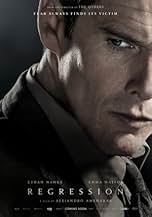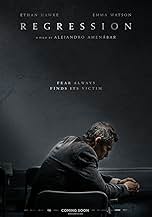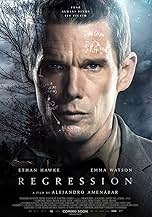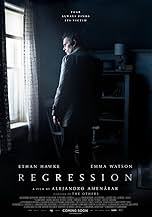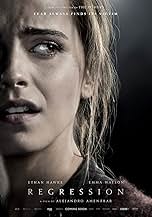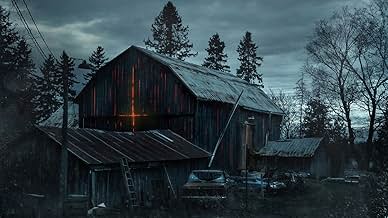AVALIAÇÃO DA IMDb
5,6/10
44 mil
SUA AVALIAÇÃO
Um detetive e um psicanalista descobrem evidências de um culto satânico enquanto investigam o terrível passado de uma jovem mulher.Um detetive e um psicanalista descobrem evidências de um culto satânico enquanto investigam o terrível passado de uma jovem mulher.Um detetive e um psicanalista descobrem evidências de um culto satânico enquanto investigam o terrível passado de uma jovem mulher.
- Prêmios
- 1 vitória e 2 indicações no total
Avaliações em destaque
I don't think this one will take any prizes for acting, or even for its fairly modest special effects, but it has a reasonably intelligent script and enough tension and intrigue to keep the audience awake. It takes its inspiration from a wave of Satanic child abuse accusations and actual court cases that swept the world in the 1980s and 90s, but fizzled out with very little hard evidence emerging and very few convictions. Many blamed 'false memories' implanted by well-meaning counselors and psychologists and even the Press, unintentionally encouraging people in the creation of fantasies. 'Regression' tries to show how, in a manner reminiscent of the Salem witch trials, human suggestibility creates 'evidence' out of thin air, and delusional states become contagious. In doing this it is of course skating on thin ice, since similar ideas have often been used in attempts to discredit the claims of those reporting genuine 'historical' cases of assault or abuse.
The resolution presented in 'Regression' is perhaps one of the least satisfying aspects of the film, and I was surprised that no reference was made to the fundamentalist Christian element for which parts of America are so famous.
I think this one entertains, and after a slowish start builds up to quite a fast and dramatic pace in the second half. I would definitely recommend seeing it, but I don't think you would lose very much by waiting for it to get to rental or television.
The resolution presented in 'Regression' is perhaps one of the least satisfying aspects of the film, and I was surprised that no reference was made to the fundamentalist Christian element for which parts of America are so famous.
I think this one entertains, and after a slowish start builds up to quite a fast and dramatic pace in the second half. I would definitely recommend seeing it, but I don't think you would lose very much by waiting for it to get to rental or television.
This film tells the story of a policeman who investigates a woman's claim that she is the victim of abuse from a Satanic cult, which includes her father and a fellow policeman colleague.
"Regression" has a very intriguing plot! I have to say that I did not see the twists coming, even though I had several possibilities in mind. Ethan Hawke is convincing as a dedicated policeman who wants to get to the bottom of the abuse, in order to help the poor woman who naturally evokes much sympathy from viewers. The story is intense because the mystery is well built, and the suspense is well kept. I enjoyed watching "Regression" a lot.
"Regression" has a very intriguing plot! I have to say that I did not see the twists coming, even though I had several possibilities in mind. Ethan Hawke is convincing as a dedicated policeman who wants to get to the bottom of the abuse, in order to help the poor woman who naturally evokes much sympathy from viewers. The story is intense because the mystery is well built, and the suspense is well kept. I enjoyed watching "Regression" a lot.
For a long time, Alejandro Amenabar has been one of my favorite writer- directors for the twisted suspense thrillers. He was quite prolific at the turn of the century -- "Thesis" (1996), "Open Your Eyes" (1997) and his English-language debut "The Others" (2001). His biographical drama "The Sea Inside" won an Oscar for Best Foreign Language Film in 2004.
Since then though, his output had been sparse. That was why when I heard that he will be releasing a new film this year entitled "Regression," I made sure I went to watch it.
Seventeen-year old Angela Gray accuses her father of sexually abusing her. Detective Bruce Kenner is assigned to her case. The father meekly admits to the crime, but does not actually recall doing it. Kenner seeks the help of Psychology professor Kenneth Raines to elicit his repressed memories, as well as those of the other members of the Gray family, via hypnotic regression. What is revealed from these sessions are diabolical confessions of such disturbing nature that Kenner himself could not get them out of his own mind.
Ethan Hawke is such a good actor, really. From his feature debut in "Dead Poet's Society," then "Before Sunrise" (and its series), "Gattaca," "Sinister" to his Oscar-nominated performances in "Training Day" and "Boyhood," this guy can really portray the most ordinary characters and wind up making them very memorable. His intense take of the obsessed Bruce Kenner was riveting and infectious. His visions become our visions, his beliefs our beliefs. He had a flawless interactive rapport with Amenabar's camera, registering and conveying the anger, paranoia, confusion, and fear of his character so well on screen.
Emma Watson returns on her trajectory to becoming a serious movie actress after being sidelined by unfortunate roles in "This is the End" and "Noah." The talent and the promise are there, but the connection with her role as the troubled Angela was not as convincing as that of Hawke's. Her best performances were still those for Hermione Granger. Her young adult performances in films like "Perks of Being a Wallflower" and "The Bling Ring" had a certain unnatural stiffness in them, as it was again here as well.
Credible supporting performances were given by David Thewlis as the authoritative Prof. Raines and David Dencik as Angela's repentant father John. Going a bit over the top was Dale Dickey and her exaggeratedly demented performance as Angela's grandmother Rose. The strangest casting decision was that of Lothaire Bluteau as the priest Reverend Murray. He exuded such a creepy vibe, which of course may be the director's intention.
While "Regression" was still not on the same level of excellence as "Open Your Eyes" or "The Others," Alejandro Amenabar returned to form with this comeback project of sorts. The script, though weak and flawed in certain aspects (like motive, for one important example), was still logical and grounded despite dealing with controversial religious and psychological matters. The storytelling engages you despite the dark unpleasant topics and relentlessly morbid atmosphere. I am looking forward to the next Amenabar opus. I hope it does not take so many years anymore. 7/10
Since then though, his output had been sparse. That was why when I heard that he will be releasing a new film this year entitled "Regression," I made sure I went to watch it.
Seventeen-year old Angela Gray accuses her father of sexually abusing her. Detective Bruce Kenner is assigned to her case. The father meekly admits to the crime, but does not actually recall doing it. Kenner seeks the help of Psychology professor Kenneth Raines to elicit his repressed memories, as well as those of the other members of the Gray family, via hypnotic regression. What is revealed from these sessions are diabolical confessions of such disturbing nature that Kenner himself could not get them out of his own mind.
Ethan Hawke is such a good actor, really. From his feature debut in "Dead Poet's Society," then "Before Sunrise" (and its series), "Gattaca," "Sinister" to his Oscar-nominated performances in "Training Day" and "Boyhood," this guy can really portray the most ordinary characters and wind up making them very memorable. His intense take of the obsessed Bruce Kenner was riveting and infectious. His visions become our visions, his beliefs our beliefs. He had a flawless interactive rapport with Amenabar's camera, registering and conveying the anger, paranoia, confusion, and fear of his character so well on screen.
Emma Watson returns on her trajectory to becoming a serious movie actress after being sidelined by unfortunate roles in "This is the End" and "Noah." The talent and the promise are there, but the connection with her role as the troubled Angela was not as convincing as that of Hawke's. Her best performances were still those for Hermione Granger. Her young adult performances in films like "Perks of Being a Wallflower" and "The Bling Ring" had a certain unnatural stiffness in them, as it was again here as well.
Credible supporting performances were given by David Thewlis as the authoritative Prof. Raines and David Dencik as Angela's repentant father John. Going a bit over the top was Dale Dickey and her exaggeratedly demented performance as Angela's grandmother Rose. The strangest casting decision was that of Lothaire Bluteau as the priest Reverend Murray. He exuded such a creepy vibe, which of course may be the director's intention.
While "Regression" was still not on the same level of excellence as "Open Your Eyes" or "The Others," Alejandro Amenabar returned to form with this comeback project of sorts. The script, though weak and flawed in certain aspects (like motive, for one important example), was still logical and grounded despite dealing with controversial religious and psychological matters. The storytelling engages you despite the dark unpleasant topics and relentlessly morbid atmosphere. I am looking forward to the next Amenabar opus. I hope it does not take so many years anymore. 7/10
If you can trust an actor to make a good horror, lately that one is Ethan Hawke. From Sinister, to The Purge, or Daybreakers, he knows how to pick them and make the most of them.
A lot more psychological than the rest, Regression has a beautiful story, with a great dark atmosphere, suspense, scares, all the ingredients to a good little horror. I was intrigued from start to end, waiting to see more, trying to wrap my brain around it, and expecting a finish that would make the most sense.
And boy I got it all! It really is a great production, an example of what a horror should look like, goes hand in hand with Deliver Us From Evil, both movies are smart and filled with tension.
Cheers!
A lot more psychological than the rest, Regression has a beautiful story, with a great dark atmosphere, suspense, scares, all the ingredients to a good little horror. I was intrigued from start to end, waiting to see more, trying to wrap my brain around it, and expecting a finish that would make the most sense.
And boy I got it all! It really is a great production, an example of what a horror should look like, goes hand in hand with Deliver Us From Evil, both movies are smart and filled with tension.
Cheers!
I knew nothing about the film before I watched it, nor about the events on which it is based. Perhaps because of this I became very confused about the film's point of view.
At base, this film asks the viewer to try to distinguish reality from fantasy during a police inquiry into accusations of satanic abuse. The problem with the fim-maker's style, for me, was that all the resources of cinema were used to illustrate not only the satanic abuse reported by witnesses but also other scenarios that had not been reported, so we saw constant scenes of abusers with spookily made-up faces and monks' cowls, and various horrific depictions of satanic abuse. Because cinema is a naturalistic medium, it was difficult to know what was fantasy and what was reality.
The film in some ways had a classic detective-story structure, with Ethan Hawke as the determined investigator. But it became clear that he was an unreliable first-person character after he began behaving irrationally, and that left me, as a viewer, with nothing to cling to as a source of viewpoint in the film. When it came to scenes in which the detective was absent, it was even more difficult to distinguish what the film-maker was depicting as real and what as fantasy. For example, when the victim's grandmother went out to her shed, she saw a normal cat, which turned into a devil cat. This had nothing to do with the investigation, yet its satanic imagery was of the same type as that provoked by the regression-therapy sessions. Perhaps some point was being made about the phenomenon of group hallucination or delusion, but the film repeatedly neglected its responsibility to give us a touchstone by which we could judge the accuracy of what we were seeing.
I think the film could have addressed the topic better with the excellent actors at its disposal by NOT depicting any of the satanic events. It would have been all the more chilling for that, adding to the tension of the inquiry. The most famous dramatisation of this sort of subject matter was Arthur Miller's "The Crucible". Miller creates nightmarish scenes of communal paranoia but without illustrating any of the events described by the witnesses. And this does not hinder the story's potency. (What could be more horrific than to see Miller's village girls in full accusatory mode, triggering the arrest of various pillars of the community on charges of devil worship?) "Regression", however, lacks the necessary moral distance from the events it depicts. Only in the last minute or two is sanity restored. I left the cinema feeling as if I had been cruelly led about by the nose to no satisfactory purpose.
At base, this film asks the viewer to try to distinguish reality from fantasy during a police inquiry into accusations of satanic abuse. The problem with the fim-maker's style, for me, was that all the resources of cinema were used to illustrate not only the satanic abuse reported by witnesses but also other scenarios that had not been reported, so we saw constant scenes of abusers with spookily made-up faces and monks' cowls, and various horrific depictions of satanic abuse. Because cinema is a naturalistic medium, it was difficult to know what was fantasy and what was reality.
The film in some ways had a classic detective-story structure, with Ethan Hawke as the determined investigator. But it became clear that he was an unreliable first-person character after he began behaving irrationally, and that left me, as a viewer, with nothing to cling to as a source of viewpoint in the film. When it came to scenes in which the detective was absent, it was even more difficult to distinguish what the film-maker was depicting as real and what as fantasy. For example, when the victim's grandmother went out to her shed, she saw a normal cat, which turned into a devil cat. This had nothing to do with the investigation, yet its satanic imagery was of the same type as that provoked by the regression-therapy sessions. Perhaps some point was being made about the phenomenon of group hallucination or delusion, but the film repeatedly neglected its responsibility to give us a touchstone by which we could judge the accuracy of what we were seeing.
I think the film could have addressed the topic better with the excellent actors at its disposal by NOT depicting any of the satanic events. It would have been all the more chilling for that, adding to the tension of the inquiry. The most famous dramatisation of this sort of subject matter was Arthur Miller's "The Crucible". Miller creates nightmarish scenes of communal paranoia but without illustrating any of the events described by the witnesses. And this does not hinder the story's potency. (What could be more horrific than to see Miller's village girls in full accusatory mode, triggering the arrest of various pillars of the community on charges of devil worship?) "Regression", however, lacks the necessary moral distance from the events it depicts. Only in the last minute or two is sanity restored. I left the cinema feeling as if I had been cruelly led about by the nose to no satisfactory purpose.
Você sabia?
- Curiosidades"Satanic Panic" is the name of the cultural obsession with "Satanic Ritual Abuse" which originated in the United States in the 1980s with the now-discredited memoir-style book "Michelle Remembers," written by Canadians Michelle Smith and her husband, psychiatrist Lawrence Pazder. The authors made waves during the 80's by traveling the talk-show circuit and testifying as expert witnesses in criminal trials alleging Satanic abuse. The book and Smith are represented in the film as "In Satan's Name" by S. Cooper, who is shown as a TV interview subject whose face is obscured in shadow to hide her identity.
- Erros de gravaçãoThe poster of Polish Death/Black Metal Band Behemoth is from 2014 whereas the film is set in 1990.
- Citações
Bruce Kenner: I am starting to use my head again.
- ConexõesFeatured in Projector: Macbeth/Regression (2015)
- Trilhas sonorasThat's Where the Blues Begin
Written by Thomm Jutz and Peter Cronin
Music Library & SFX SL / Audio Network Ltd
Principais escolhas
Faça login para avaliar e ver a lista de recomendações personalizadas
- How long is Regression?Fornecido pela Alexa
Detalhes
- Data de lançamento
- Países de origem
- Central de atendimento oficial
- Idioma
- Também conhecido como
- Regression
- Locações de filme
- RC Harris Water Treatment Plant, Toronto, Ontário, Canadá(prison exteriors)
- Empresas de produção
- Consulte mais créditos da empresa na IMDbPro
Bilheteria
- Orçamento
- US$ 20.000.000 (estimativa)
- Faturamento bruto nos EUA e Canadá
- US$ 55.039
- Fim de semana de estreia nos EUA e Canadá
- US$ 33.915
- 7 de fev. de 2016
- Faturamento bruto mundial
- US$ 17.671.101
- Tempo de duração1 hora 46 minutos
- Cor
- Mixagem de som
- Proporção
- 2.35 : 1
Contribua para esta página
Sugerir uma alteração ou adicionar conteúdo ausente




